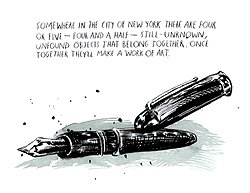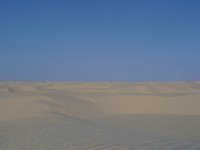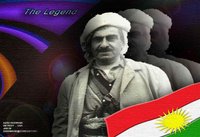I am living in the Villa Beg, dad. There is not a crumb of dirt anywhere, nor a chair misplaced. We are all alone here and we are dead.
a poetic misdivision

So I find out my bar results tomorrow morning. While in Albany for a test I ran across an old friend who had been in Iraq and Afghanistan (among other places) for the last few years and had a good time chatting with him. On this eve of getting my results and maybe out of a karmic interest I thought I'd plug his riveting but long-un-updated blog and his profile at the New American Foundation - we all hope his book comes out soon...
ps: BBC sez UK used white phosphorous in fallujah
----------------------------------------------------------------
Outside View: The Small, Daily Abu Ghraibs
Nir Rosen - UPI - September 21, 2005
My career as a journalist began in Iraq. My big break was writing a piece for the New Yorker magazine about the Iraqi resistance in Fallujah, so I have remained attached to that city--and I am not the only one.
In July I was in Mogadishu, Somalia. Men there wear T-shirts emblazoned "Fallujah," shops bear the name, too.
In August I was in Pakistan, where magazines are sold dedicated to the heroes and martyrs of the town. In Saudi Arabia, the al-Qaida group that killed foreign workers in 2004 was named the Fallujah Squadron.
All that is in honor of Fallujah's resistance to the United States.
Fallujah of course was wiped off the map for its defiance of the U.S. occupation--but it is useful to remember that the reason the resistance in Fallujah started was not because the town was special but because shortly after the war ended American troops shot dozens of peaceful demonstrators in two separate incidents.
For every action, there is a reaction.
I spent about a year and a half in Iraq. It was obvious early on, and continues to be, that the main problem in Iraq, the main obstacle to progress, is the U.S. occupation.
When it ends, attacks against U.S. forces in Iraq will end as well.
It seems obvious, almost a tautology, but it is true worldwide as well. The American empire will cease to be a target when it ceases to directly or indirectly oppress weaker people.
Terrorism--inasmuch as the word has any meaning, but that's another argument--is not a phenomenon or an entity. It is a tool of politics by other means, just like war.
Terrorists act for specific reasons to achieve specific goals, like all political actors, they simply don't have the conventional methods that modern states have. We are focused on terrorism emanating from the Muslim world, but that is obviously not at all the only kind.
The motives for Muslim terrorism directed against America are not secret; they are clearly stated over and over again by the most reliable sources, the perpetrators themselves.
The reasons are Israel, Iraq, Afghanistan, Chechnya, Guantanamo, America's presence on holy Muslim land and its support for dictatorial and corrupt regimes. In their statements terrorist leaders and their foot soldiers attribute their war to these specific grievances.
Throughout my travels in the Muslim world, in Africa, the Middle East and Asia, I have heard the same complaints from Muslims of every variety, secular and devout, over and over. They do not resent America for its freedom, its capitalism, its culture, its democracy or any other aspects of its identity.
They resent America for its perceived war against the Muslim world and its support for Israel's war against the Palestinians.
In Iraq, America is attacked because it is a brutal occupier, humiliating Iraqis, destroying villages, arresting, beating and killing countless innocent men, women and children.
This is the main cause of the resistance.
I have witnessed these things, they are not the ramblings of a leftwing polemicist.
If America was not occupying Iraq, there would be no resistance.
The vast majority of the resistance in Iraq is Iraqi--I will get to the Abu Musab al-Zarqawi movement in a moment, since it is the exception.
While the crimes of Abu Ghraib are well known, they distract attention from the smaller, daily, persistent Abu Ghraibs that make up military occupation.
Constantly having foreign occupiers point their machine guns and tank guns at you everywhere you go, you are always aware that they have power over your life.
They determine what road you can use and when; they can break into your home and destroy your property with impunity; arrest and physically abuse your men with impunity; they can kill you--accidentally or on purpose--with impunity; and you know people to whom all of this has happened.
They build immense concrete walls in your city, they surround it with barbed wire, they dictate your future political system to you.
In a word--they terrorize you. This is what fuels the Iraqi resistance.
In Israel a far more brutal occupation in defiance of international law and U.N. resolutions has persisted for decades thanks only to the blind dogmatic support from the United States, which has never been an honest broker in the Middle East.
The national aspirations of an entire people have been denied while their homes are destroyed, their people killed and oppressed and their very identity and existence in jeopardy.
America, the most powerful nation on earth, supports the Israelis and vilifies the Palestinians--and it is not just the U.S. government.
Last month, a few thousand Jewish fanatics who illegally settled on occupied land in Gaza and went on the occasional pogrom, attacking Palestinians upon whose land they had settled, were given more attention and sympathy by the American media in a week or two than it has given in five years to the Palestinians whose homes have been destroyed, who are not permitted to live as humans, and who inhabit a giant prison.
None of this is lost on the rest of the world, especially that part of it which for linguistic, cultural or religious reasons identifies with the Palestinians.
In Afghanistan, America has bombed or shot innocent civilians, arrested innocent Afghanis and tortured them, sometimes to death, all with the same impunity they enjoy in Iraq.
To us, these are accidents we regret and forget. To the Muslim world they are more proof that their lives do not matter, that they are not viewed as human.
In Karachi last month the director of a madrasa, or Islamic seminary, asked me why the world made such a big deal out of the death of a mere 50 people in London, but raised no hue and cry for the many innocent Muslim victims of bombs in Afghanistan, Iraq or elsewhere.
Not all terrorists are victims of oppression, some, including most-famously Osama bin Laden, had a privileged life. But they identify with an oppressed and humiliated nation. It is a collective identity of shame and resentment.
It is their brothers and sisters killed in Iraq, Palestine, Kashmir, Afghanistan and Chechnya. It is their nation that is under attack.
Others, like the Zarqawi movement in Iraq, are more nihilistic.
They seek to destroy the hated Shi'ites, whom they view as subhuman as and worse than infidels. They seek not just to end the American occupation, but to kill Jews and Christians throughout the world.
Their ideologues speak of a Manichean clash between the Muslim world and the non Muslim world, but their foot soldiers are still motivated by specific grievances.
It is often asked, "Why do they hate us?"
The simple truth is that they do not hate us not for who we are, but for what we do.
An American withdrawal from Iraq and an Israeli withdrawal from all the occupied territories to the 1967 lines would do more to fight terrorism than any military action ever could.
But there is one other thing we can do, too: We could attempt to imagine what it feels like to be on the other side of the Iraq equation--living under military occupation and on the receiving end of American military violence--and how we would react were we on that other side.
----------------------------------------------------------------

Crossing the Valley
Fadhil al-Azzawi
From Iraqi Poetry Today
This desolate valley is crowded with thieves
but I'm crossing it alone.
I'm afraid of no one,
for I have neither gold nor silver in my saddle.
This desolate valley stretches before me
dotted with stones that shimmer like mirrors in the sun.
I drag my mules behind me and sing happily to myself.
Often rain pours down in this valley.
But there is no cave to shelter me
and I don't have a tent.
If the flood comes and water is everywhere
who will save me in an ark?
Yet, I go on without a miracle,
sheltering in my hand my heart's ember,
hoping to set fire to the world's dead wood
and to feed the ghosts that regularly dine at my table.
Alone I cross this valley
and the wind diligently follows me.

Picture
Bekes Jr (Sherko Faiq) - Kurdish poet laureate
Four children
a Turk, a Persian
an Arab and a Kurd
were colelctively drawing the picture of a man.
The first drew his head
The second drew his hands and upper limbs
The third drew his legs and torso
The fourth drew a gun on his shoulder
A Poet's Fate
Awad Nasir
My country does not belong to me
nor I to it.
For five millenia my country has been no more than imminent exile.
It is my destiny to steal away like a thief
and enter like a thief
I am the one who steals fire from the creator.
But it's my destiny,
that of an ear of wheat,
which when it grows tall
is threatened by the one who wields a sickle.
Tenebrae
Paul Celan
Near are we, Lord,
near and graspable.
Grasped already, Lord,
clawed into each other, as if
each of our bodies were
your body, Lord.
Pray, Lord,
pray to us,
we are near.
Wind-skewed we went there,
went there to bend
over pit and crater.
Went to the water-trough, Lord.
It was blood, it was
what you shed, Lord.
It shined.
It cast your image into our eyes, Lord.
Eyes and mouth stand so open and void, Lord.
We have drunk, Lord.
The blood and the image that was in the blood, Lord.
Pray, Lord.
We are near.
----------------------------------------------------------------
For some more stories in yr spare time, cheque out these brilliant bits:
Anne Carson (she of the brilliant and ineffable fictional tangos )- The Economy of the Unlost (pdf)
Robert Kelly (Black Sparrow is still nice) - with an essay that rewrites Borges as a New Critic

0 Comments:
Post a Comment
<< Home